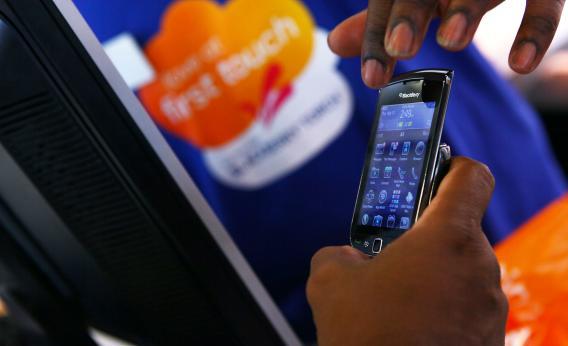On Monday, the White House threw its support behind a petition to make unlocking cellphones legal. “The White House agrees with the 114,000+ of you who believe that consumers should be able to unlock their cellphones without risking criminal or other penalties. In fact, we believe the same principle should also apply to tablets, which are increasingly similar to smart phones,” R. David Edelman, the senior advisor for Internet, innovation, and privacy, noted in the response.
It was welcome news for consumers and Internet freedom advocates alike, but translating White House support into action will be a much tougher lift. As Edelman acknowledges, the mere response won’t change anything. Congress may need to “enact some narrow legislative fixes,” he wrote, and “the Federal Communications Commission (FCC), with its responsibility for promoting mobile competition and innovation, has an important role to play …” That role will require the FCC to take on the nation’s two wireless giants, AT&T and Verizon, a task it has not been up for as of late. Together AT&T and Verizon control two-thirds of the wireless market—and they have no intention of giving that up by unlocking phones and empowering consumers to easily switch to other carriers.
“Locked” mobile devices can only be used on the carrier’s network for which they were purchased. Users can typically remove the lock by entering a specific code that carriers can provide at their discretion or by obtaining the code from a third party. Beginning in 2006, the Library of Congress, under the recommendation from the United States Copyright Office, created an exemption from the Digital Millennium Copyright Act that meant users who unlocked their mobile device without authorization from the mobile carrier would not be liable under the statute. But in October, the Library of Congress, decided to remove that exemption. Now unlocking new cellphones without permission can be considered a criminal offense. Individuals who engage in unauthorized unlocking could be subject to a $500,000 fine and five years in prison. Whether or not the full extent of these penalties would be imposed on individual users is a question that remains to be answered. However, it’s absurd that the question exists at all—that the statute would, on its face, call for jail time or hefty fines for simply unlocking a phone or device that you own.
The Copyright Office’s 2012 decision was a 180 from its past thinking on the issue. In its 2006 recommendation, the office noted that unlocking “is a noninfringing activity by the user. … [T]he purpose of the software lock appears to be limited to restricting the owner’s use of the mobile handset to support a business model, rather than to protect access to a copyrighted work itself.”
Members of Congress are already working on legislation that would permanently permit users to jailbreak or unlock their phones or tablets. That way, consumers who want to unlock their phone will no longer be subject to the variability of the Library of Congress process. But that effort alone will not free your phone entirely.
The nation’s largest mobile carriers have never been particularly keen on allowing consumers to take a device from carrier to carrier, and they have a number of tools at their disposable to make it difficult, if not impossible, to do so. For instance, they can use different mobile technologies, each of which relies on a unique set of communication protocols. In the United States, AT&T and T-Mobile utilize the GSM standard, while Verizon and Sprint use CDMA. You can’t take a GSM phone to Verizon or a CDMA phone to T-Mobile. But it is also difficult to transfer between two providers that use the same standard. CDMA requires you get your carrier’s permission, and carriers are not required to accept the phone onto their networks. The GSM standard, on the other hand, includes the use of a removable SIM card that stores customer and network information. Technically, then, a user should be able to take her existing SIM card from one provider and place it into a new phone from another. But you may still be required to get a code to unlock the device from your carrier or a third party—and there’s no guarantee the carrier will give it to you.
Many expected the transition to LTE, often marketed as 4G, to bridge the divide between CDMA and GSM. Indeed, the LTE standard allows for a GSM-like removable SIM to enable users to take their LTE device from carrier to carrier. Unfortunately, AT&T and Verizon have each dictated that manufacturers design devices that work only on their own networks. For example, in 2008, a set of frequencies in the 700 MHz band of radio spectrum were auctioned to a number of mobile carriers. AT&T and Verizon, the biggest winners of that auction, are now deploying LTE networks on those frequencies, but they are doing so with equipment and phones that can operate only on their set of frequencies, not on any other carriers’ networks also in the band. The FCC has been looking into the possibility of mandating interoperability in the 700 MHz band, but—surprise!—AT&T and Verizon oppose any such intervention.
This week FCC Chairman Julius Genachowski, released a statement in support of unlocking cellphones, which is great—but the interoperability issue has been before the FCC for more than a year. There’s no indication that the commission will step in to promote competition and empower consumers. Genachowski is also rumored to be on his way out once his current term is up, meaning this and other policy debates around unlocking phones may fall to a new chairman. Given the Obama administration’s support on the issue, it should be a litmus test for the next nominee.
The fight to free our phones can’t just stop with Obama signing a decree. It will require Congress and the FCC to take action and for that to happen, the public will need to keep the pressure on.
